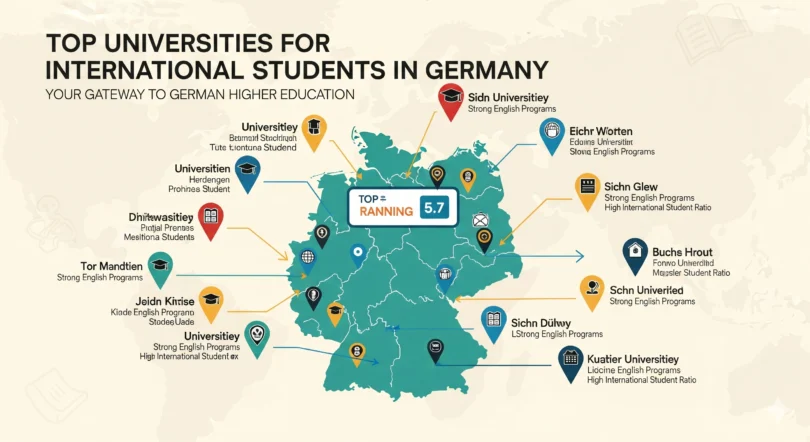Top Universities in Germany for International Students
Introduction
Germany is one of the most popular destinations for international students seeking high-quality education at affordable costs. Over my 15 years as a study abroad consultant, I have guided hundreds of students to German universities, helping them navigate admissions, scholarships, and life in Germany.
In this guide, I’ll provide an in-depth overview of Germany’s top universities, the programs they offer, scholarship opportunities, student life, and practical tips for a smooth study abroad journey. Whether you are aiming for science, engineering, business, or arts, Germany offers world-class education and a rich cultural experience.
Why Study in Germany?
Germany has become a leading destination for international students due to several reasons:
- Low or No Tuition Fees – Many public universities in Germany offer tuition-free education, making it ideal for budget-conscious students.
- High Academic Standards – German universities are globally recognized for their research and teaching quality.
- Industry Connections & Career Opportunities – Universities often collaborate with industries, providing internships, co-op programs, and job opportunities.
- Diverse Programs in English – Many programs are now offered in English, especially at the master’s level.
- Multicultural Environment – Germany is home to a large international student community, easing adaptation and cultural integration.
Top Universities for International Students in Germany
Here’s a detailed look at the leading German universities for international students:
1. Technical University of Munich (TUM)
- Focus Areas: Engineering, Natural Sciences, Computer Science, Business
- Highlights: TUM is Germany’s top-ranked technical university, renowned for research and innovation. It offers excellent infrastructure and global collaboration opportunities.
- Consultant Tip: Prepare a strong academic CV highlighting projects, internships, and research experience to boost your admission chances.
2. Ludwig Maximilian University of Munich (LMU)
- Focus Areas: Humanities, Sciences, Social Sciences, Medicine
- Highlights: LMU is famous for academic excellence, offering diverse programs and strong research opportunities. The university provides extensive support for international students.
- Consultant Tip: Showcase your passion for research and intercultural competence in your application.
3. Heidelberg University
- Focus Areas: Medicine, Natural Sciences, Social Sciences, Arts
- Highlights: As Germany’s oldest university, Heidelberg combines tradition with cutting-edge research. Students benefit from a rich academic culture and vibrant campus life.
- Consultant Tip: Early application is essential due to high competition for scholarships and admissions.
4. University of Freiburg
- Focus Areas: Engineering, Sciences, Humanities, Social Sciences
- Highlights: Freiburg is renowned for research programs, sustainable practices, and a friendly, student-oriented environment.
- Consultant Tip: Highlight relevant academic achievements and willingness to engage in research projects.
5. University of Mannheim
- Focus Areas: Business, Economics, Social Sciences
- Highlights: Known as Germany’s leading business university, Mannheim provides strong industry connections, internships, and international networking opportunities.
- Consultant Tip: Emphasize analytical skills, teamwork, and prior business experience in applications.
6. Humboldt University of Berlin
- Focus Areas: Arts, Humanities, Social Sciences, Sciences
- Highlights: Humboldt is internationally recognized for research excellence and academic innovation. Students enjoy a vibrant urban lifestyle in Berlin.
- Consultant Tip: Be clear about your research interests and career goals to strengthen your application.
7. RWTH Aachen University
- Focus Areas: Engineering, Sciences, Computer Science, Business
- Highlights: RWTH is famous for engineering and technical programs, offering practical training and strong ties to industry leaders.
- Consultant Tip: Highlight technical projects and problem-solving skills to stand out in the admission process.
8. University of Stuttgart
- Focus Areas: Engineering, Architecture, Natural Sciences, Economics
- Highlights: Stuttgart emphasizes innovation, technical skills, and research-led learning. International students have access to supportive resources and student services.
- Consultant Tip: Demonstrate practical experience, internships, and interest in technology-driven solutions.
9. Free University of Berlin
- Focus Areas: Social Sciences, Political Science, Humanities, Economics
- Highlights: Free University offers a dynamic, research-oriented environment, ideal for students pursuing interdisciplinary studies.
- Consultant Tip: Highlight research potential and engagement with societal issues in your statement of purpose.
10. University of Tübingen
- Focus Areas: Life Sciences, Medicine, Humanities, Social Sciences
- Highlights: Tübingen combines academic rigor with a welcoming, international student community. Scholarships and exchange programs are widely available.
- Consultant Tip: Focus on your academic achievements, research skills, and motivation for interdisciplinary learning.

Scholarships and Financial Support in Germany
Scholarships and Financial Support
Germany provides multiple avenues for financial assistance to international students:
- DAAD Scholarships – Offered by the German Academic Exchange Service, covering tuition, living costs, and travel.
- University-Specific Scholarships – Many universities offer merit-based or need-based support.
- Research & Exchange Programs – Funding for students involved in collaborative research or exchange programs.
Consultant Advice: Start researching scholarships 6–12 months in advance. Tailor applications to highlight achievements, career goals, and alignment with program objectives.

Student Life in Germany
Student Life in Germany
Student life in Germany is both enriching and enjoyable:
- Cultural Integration: Join student societies, attend cultural events, and experience Germany’s diverse heritage.
- Part-Time Work Opportunities: International students can work up to 20 hours per week during term, helping manage living costs.
- Internships & Networking: Universities maintain strong industry links, providing valuable internships and professional connections.
Consultant Insight: Engaging actively in student life enhances personal growth, networking, and employability.

Practical Tips for International Students Germany
Practical Tips for International Students
- Plan Early: Start university research and application preparation at least a year in advance.
- Language Skills: While many programs are in English, learning basic German enhances daily life and job prospects.
- Documentation: Keep transcripts, letters of recommendation, CV, and personal statements ready.
- Budgeting: Germany is affordable compared to other Western countries, but plan for accommodation, insurance, and living expenses.
- Connect with Alumni: Reach out to past students for insights on universities, programs, and life in Germany.
Conclusion
Germany offers international students a unique blend of academic excellence, research opportunities, and cultural diversity. By choosing the right university, leveraging scholarships, and engaging in student life, students can ensure a successful and fulfilling study abroad experience.
As an experienced consultant, I advise students to focus on their academic goals, career aspirations, and personal growth while selecting a German university. Early planning, a strong application, and proactive engagement with the academic and social environment will make your journey in Germany both productive and enjoyable.









